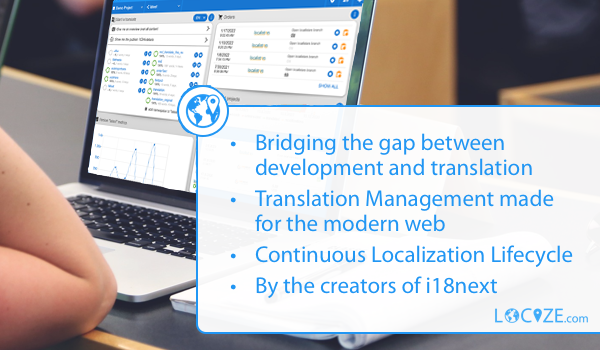Introduction
This is a i18next backend to chain multiple other backends and caches. So you can define an additional caching backend or fallback backends.
Usage examples for caching configurations can be found here and for fallback backends can be found here.
How it works
For each backend read call (so for each language and namespace combination), it will try to read from from all backends in order until a backend returns some resources. So if it does not find the resource (language + namespace) in the first backend, it goes to the next, etc.
Getting started
Source can be loaded via npm or downloaded from this repo.
# npm package
$ npm install i18next-chained-backend
Wiring up:
import i18next from 'i18next';
import Backend from 'i18next-chained-backend';
i18next
.use(Backend)
.init(i18nextOptions);- As with all modules you can either pass the constructor function (class) to the i18next.use or a concrete instance.
- If you don't use a module loader it will be added to
window.i18nextChainedBackend
Backend Options
{
// array of existing i18next backends from https://www.i18next.com/plugins-and-utils.html#backends
backends: [],
// array of options in order of backends above
backendOptions: []
}Options can be passed in:
preferred - by setting options.backend in i18next.init:
import i18next from 'i18next';
import Backend from 'i18next-chained-backend';
i18next
.use(Backend)
.init({
backend: options
});on construction:
import Backend from 'i18next-chained-backend';
const Backend = new Backend(null, options);via calling init:
import Backend from 'i18next-chained-backend';
const Backend = new Backend();
Backend.init(null, options);more complete sample
import i18next from 'i18next';
import Backend from 'i18next-chained-backend';
import Locize from 'i18next-locize-backend'; // load from service
import HttpApi from 'i18next-http-backend'; // have a own http fallback
i18next
.use(Backend)
.init({
backend: {
backends: [
Locize, // primary
HttpApi // fallback
],
backendOptions: [{
projectId: 'myLocizeProjectId'
}, {
loadPath: '/locales/{{lng}}/{{ns}}.json' // http api load path for my own fallback
}]
}
});More locize examples can be found here:
TypeScript
To prevent TypeScript errors/conflicts with other plugins, we recommend placing i18next-chained-backend import above other plugins. Also, make sure to set skipLibCheck to true under your tsconfig file.
import i18next from 'i18next';
import Backend from 'i18next-chained-backend'; // i18next-chained-backend should be placed here
import Locize from 'i18next-locize-backend';
import HttpApi from 'i18next-http-backend';IMPORTANT ADVICE for the usage in combination with saveMissing/updateMissing
We suggest not to use mutliple backends in combination with saveMissing or updateMissing, because it may happen, that the trigger for this is based on stale data.
Gold Sponsors
localization as a service - locize.com
Needing a translation management? Want to edit your translations with an InContext Editor? Use the orginal provided to you by the maintainers of i18next!
With using locize you directly support the future of i18next and react-i18next.






